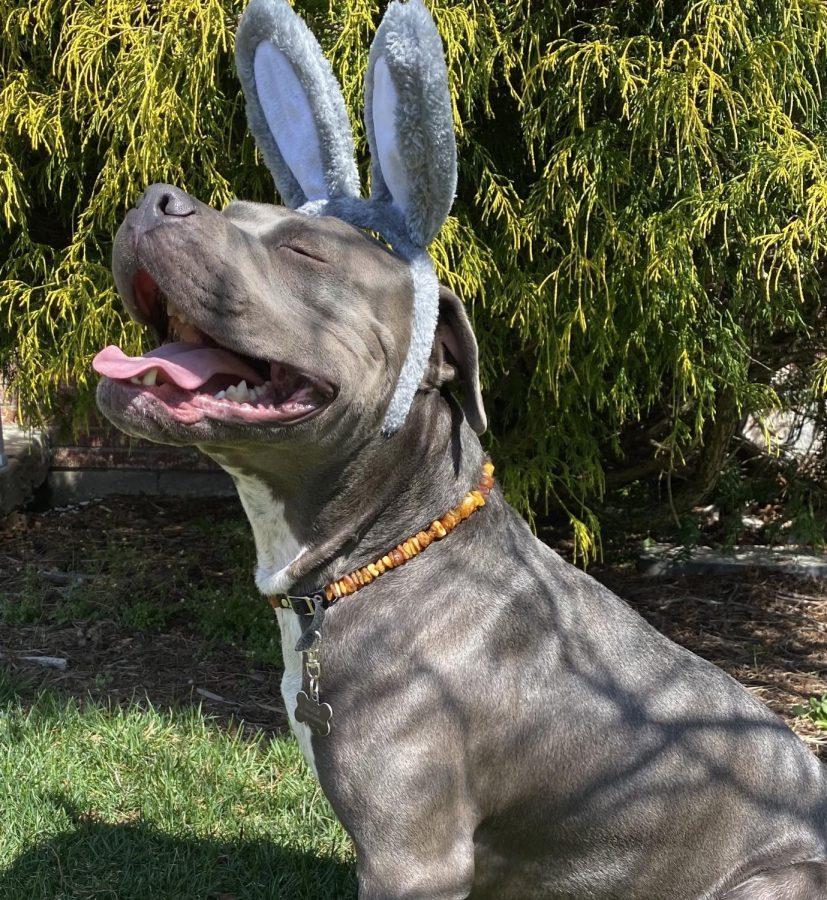Opinion | Don’t bully my breed
March 20, 2022
You see that cute face pictured above? That’s my dog, River.
Like the impulsive person I am, I adopted a dog one month after moving out of my parents’ house in 2020. He is the first dog I’ve ever owned, and when I was looking for one to adopt, I had three criteria that must be met — it must be a rescue, fully grown and a pit bull.
I got River from a rescue in Brookfield, Ohio, which knew almost nothing about him. Before arriving at the rescue, he was transported from a shelter in Georgia — one of the Southern states overflowing with animals and home to many kill shelters, although things have started to improve there.
Because of his unknown history, the details about River’s past I know are ones that I’ve filled in — like that he came to me with heartworms, meaning he probably lived outside for a period of time; has scars on his legs and backside; is scared of hairbrushes, shadows and sudden noises, leading me to assume he may have been abused. I cried when my pap told me the mark on his rear looks like it may have been made by a cattle prod, because the thought of anyone hurting a dog — let alone my dog — was enough to break my heart.
Although River definitely suffered in his past, he now leads a very privileged life filled with too much people food, infinite amounts of snuggles and the privilege of sleeping under the comforter every single night. For a boy who once had to survive on the streets, he now relies on me for everything and, if I’m being honest, it’s a little pathetic. Nonetheless, he deserves every ounce of love he gets, because River has never given me a reason to make any other conclusion.
Even with all of his quirks and mysteries derived from his unknown past, you would never know he suffered if you met him. River is genuinely the sweetest dog and loves every person he meets — and that goes for any pit bull I’ve ever met. Despite this reality, he is banned or restricted in hundreds of cities across the country and many nations around the world. Things need to change because these policies are costing innocent lives — all at the stake of peoples’ misconceptions.
Pit bulls are the most euthanized breed in American shelters, accounting for about 40% of all euthanized dogs. This probably has to do with the breed being one of the most abundant in shelters, too — the exact reason why my first dog had to be a pittie.
There is too great a sentiment that pit bulls are dangerous, vicious dogs. The reality is that, yes, some pit bulls are genetically predisposed to perform certain actions or have specific characteristics — including tenacity and fearlessness, which can make them better for fighting than other dogs — but they’re also protective and loving animals that have made great family pets for decades.
The American Society for the Prevention of Cruelty to Animals has said that “… while a dog’s genetics may predispose it to perform certain behaviors, tremendous behavioral variation exists among individuals of the same breed or breed type.” Therefore, basing all opinions of a breed based on sensationalized stories and horror tales is inaccurately biased.
The ASPCA also said pit bulls may be more prone to aggression towards other dogs, but this can be mitigated with proper training and handling, like any other dog breed. It has also been found that pit bulls bred or trained to fight were not actually prone to aggression toward people.
The University of Pennsylvania conducted a year-long study of dog owners who “… use confrontational or aversive methods” to train aggressive pets. Veterinary researchers found owner aggression is actually a much greater cause of aggression in dogs than anything inherent to the breed. A study out of the University of Bristol’s School of Veterinary Sciences drew the same conclusion for dogs in the United Kingdom.
I was out with my friend this past week, and when we saw a beautiful pittie, we asked if we could pet her. She was a beautiful girl, and excited, so her owner apologized for the jumping. I responded by saying no worries, since I have my own dog who jumps. I proceeded to tell the man that my dog is a rescue, to which he replied that they don’t have any life left in them and are too unpredictable. I was furious. He boasted about how his dog is a purebred, saying it’s the only way to go with pit bulls.
It seems that even pit bull owners are part of the problem. They continue to rank rescue pits as inferior, unpredictable and therefore unworthy of love. People like that man help to perpetuate the stigma that pit bulls are aggressive and unmanageable, and this is coming from people who know the breed — so people take their opinions as truth. In a place where so many pit bulls sit in shelters or rescues who need loving homes, this narrative can prove deadly.
If you claim to be an animal lover or are a person with pets, you should see the merit of judging an animal based on its individual character, instead of an assumption based on their breed. All animals are deserving of love and acceptance, and this starts by lifting breed-specific legislation.
One way that I am helping to end the stigma against pit bulls is by taking River on walks in public places, and bringing him along to as many places as I can. People can’t resist his smile, so he tends to make many friends anywhere we go — something I enthusiastically encourage. People’s faces light up after these interactions, but I am the one to thank them for stopping. This small action of allowing, or offering, people to pet my dog is, I hope, helping people to see how wonderful this breed is.
If you see someone walking around campus with a big grey dog — possibly wearing a plaid vest or blue raincoat — that is River and me. Come say hi and see just how precious pit bulls really are.
And remember friends — adopt, don’t shop your animals. There are so many deserving companions waiting for their forever homes. Rescue animals are just as great, or even better, than purebreds. Hell, I got my best friend for $0, and who can beat free?
Grace DeLallo writes about social, environmental and political issues. Write to her at [email protected].









